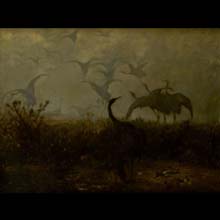
material: oil on canvas
dimensions: 44,2 × 57,8 cm
description: Chełmoński’s early works, the results of his trips to the Polish Eastern Borderlands, were produced during his Warsaw period (1867–1871). It was then that the artist painted two moody nocturnes with a motif of cranes, probably inspired by the epic poem Pan Tadeusz by Adam Mickiewicz. One of them is this picture of a flock of cranes at the crack of dawn, getting ready for their flight south before the approaching winter. Birds with graceful figures are rising from the ground in the misty scenery of the marshy landscape. The viewer’s attention is attracted by one of them – the one with a broken wing. Cranes, carrying a multitude of symbolic meanings, signify Chełmoński’s desire to go to distant Munich – following his friends and colleagues. A subtle, narrow tonality oscillating between greys, browns and black, broken with the golden pink glow of the sky and relieved by the red dots of flowers in the area of the meadow, enhances the intimacy of the scene. The symbolism of wilderness permeating Cranes was to return in the works produced after Chełmoński’s coming back from Paris. The motif of a flock of cranes re-appeared – as if a bridge between his early and mature works – in the last, unfinished canvas from 1913, entitled Cranes in the Morning. Aleksandra Krypczyk
exposition: The Gallery of 19th Century Polish Art in Sukiennice,
The Cloth Hall, 1, Main Market Square
key: Realism, polish impressionism, beginnings of symbolism >>>
dimensions: 44,2 × 57,8 cm
description: Chełmoński’s early works, the results of his trips to the Polish Eastern Borderlands, were produced during his Warsaw period (1867–1871). It was then that the artist painted two moody nocturnes with a motif of cranes, probably inspired by the epic poem Pan Tadeusz by Adam Mickiewicz. One of them is this picture of a flock of cranes at the crack of dawn, getting ready for their flight south before the approaching winter. Birds with graceful figures are rising from the ground in the misty scenery of the marshy landscape. The viewer’s attention is attracted by one of them – the one with a broken wing. Cranes, carrying a multitude of symbolic meanings, signify Chełmoński’s desire to go to distant Munich – following his friends and colleagues. A subtle, narrow tonality oscillating between greys, browns and black, broken with the golden pink glow of the sky and relieved by the red dots of flowers in the area of the meadow, enhances the intimacy of the scene. The symbolism of wilderness permeating Cranes was to return in the works produced after Chełmoński’s coming back from Paris. The motif of a flock of cranes re-appeared – as if a bridge between his early and mature works – in the last, unfinished canvas from 1913, entitled Cranes in the Morning. Aleksandra Krypczyk
exposition: The Gallery of 19th Century Polish Art in Sukiennice,
The Cloth Hall, 1, Main Market Square
key: Realism, polish impressionism, beginnings of symbolism >>>












